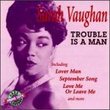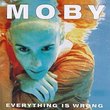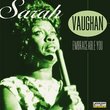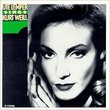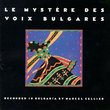| All Artists: Franz [Vienna] Schubert, Jenö Jandó Title: Schubert: Piano Sonatas, D. 960 & D. 958 Members Wishing: 0 Total Copies: 1 Label: Naxos Original Release Date: 1/1/1992 Re-Release Date: 2/15/1994 Genre: Classical Styles: Forms & Genres, Sonatas, Historical Periods, Romantic (c.1820-1910) Number of Discs: 1 SwapaCD Credits: 1 UPC: 730099547529 |
Search - Franz [Vienna] Schubert, Jenö Jandó :: Schubert: Piano Sonatas, D. 960 & D. 958
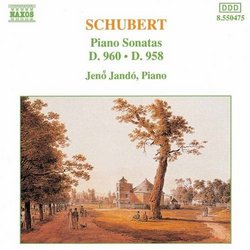 | Franz [Vienna] Schubert, Jenö Jandó Schubert: Piano Sonatas, D. 960 & D. 958 Genre: Classical
![header=[] body=[This CD is available to be requested as disc only.]](/images/attributes/disc.png?v=430e6b0a) ![header=[] body=[This CD is available to be requested with the disc and back insert.]](/images/attributes/disc_back.png?v=430e6b0a) ![header=[] body=[This CD is available to be requested with the disc and front insert.]](/images/attributes/disc_front.png?v=430e6b0a) ![header=[] body=[This CD is available to be requested with the disc, front and back inserts.]](/images/attributes/disc_front_back.png?v=430e6b0a) |
Larger Image |
CD DetailsSimilarly Requested CDs
|
CD ReviewsGreat Schubert Find reviewernjm | Manhattan, Kansas USA | 10/15/2001 (5 out of 5 stars) "This CD of two of the three late sonatas by Schubert is excellently conveyed by Jeno Jando, who is able to capture what Schumann referred to Schubert's music as its "Heavenly Length". Not as popular as Schubert's Impromptus or Moments Musicaux, the Sonatas, in my opinion, are just as well crafted, and seem to have a symphonic nature about them. The last sonata is played with extraordinary breadth and a sense of confidence. And the price is unbeatable as well-You can never go wrong with Naxos." A Divine Spark Hexameron | 05/05/2007 (5 out of 5 stars) "Of all the Naxos issues of Schubert's Piano Sonatas, this particular line up, the D. 960 and D. 958 might be the most challenging for Jeno Jando. In the other five volumes of Schubert's Sonatas, Jando has shown consistent proficiency and I think he is meritorious for his interpretations. But when it comes to these two Sonatas, Jando has too many top-tier pianists to contend with. Who would shed the indomitable Perahia or the inspired Brendel for a rendition from Jando? Well, perhaps no one, without an open mind. In my estimation, though, if Perahia and Brendel are great pianists, then Jando is very good.
It's astounding that after the death of Beethoven, the quality of Schubert's compositional output increased almost exponentially. In 1828 he wrote his three last testaments to the piano sonata, his "three sisters... a grandiose trinity of posthumous works" as Bernhard Paumgartner called them, the D. 958, D. 959 and D. 960. Jando did unbelievably well with the D. 959 that I could place him alongside Kempff or Uchida easily. His performance of the D. 958 is close to reaching that same zone, displaying a mixture of articulate phrasing and powerful expression. In the stormy Beethovenian opening movement, Jando seems like he has the right mindset, evoking restlessness and turbulence. Compared with Perahia, Jando is a little staccato-happy, preferring a graceful detached attack. This works to the point of being immaculate in the Adagio, that sublime mist of Schubert's deepest meditations. Jando calls upon Beethoven's 'Pathetique' and takes his time to communicate the deepest kind of melancholy. In the last two movements, Jando applies plenty of drama to his conceptions of these pieces. In the third movement, especially, he brings out the best in the contrasting agitation and lyricism of the minuet theme. Schubert's gentle and contemplative last Sonata in B flat major D. 960 is somewhat mysterious when compared to its predecessors. While there are sections of fury and passion here or there, the work takes on an air of introspection. In the warm first movement, the darkness of the D. 958 is absent, but there is some lurking "Sturm und Drang" that occasionally pokes its head out from the staves. Jando exhibits total emotional control and technical finesse in this opening movement. As with the Andantino of the D. 959, Jando is also wondrously effective in Schubert's melancholy slow movements. In the Andante sostenuto, that lovely but solemn movement which seems on the verge of breaking free from sadness, Jando doesn't fumble around; he plays with the conviction that Beethoven's Adagio's always receive. Jando's adroit handling of the last two movements, specifically the final Allegro, is also praiseworthy. His clean interpretation is the most unmannered I've heard and he lets the melodic lines develop their individual tones of voice. Speaking of voices, I should warn the squeamish that if the volume is turned up high enough you might hear Jando humming. I have some grievances with humming, but if the interpretation and delivery is superior, I usually forget about it. Rest assured, Jando's humming is not nearly as bad as Gould's. Bottom line: I think this CD deserves 5 stars simply because Jando can play Schubert really well. Opinions may diverge on whether he can play Schubert like the best of them, but Jando is always thoughtful and emotionally involved. Aside from the humming, Jando has never annoyed my ears with his interpretations and I respect the strengths of his playing in all of Schubert's Sonatas. It will be hard to convince the Schubert lover to sample Jando, which is why I stated from the beginning that presenting these two famous Sonatas was a gamble. Open minds, however, will be rewarded for rolling the dice." |

 Track Listings (8) - Disc #1
Track Listings (8) - Disc #1

